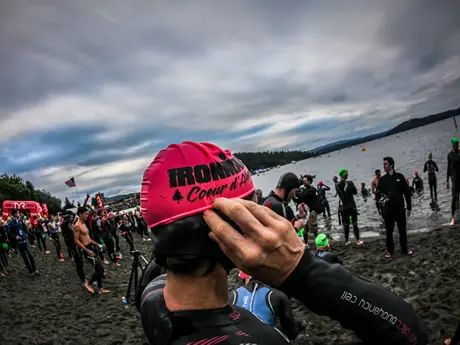
As the Endurance Nation coach, I am responsible for planning the seasons of every one of our triathletes, and outlining their movement through our training plans across their race calendar.
One of the most frequently asked questions I see in this role is: "Should I race an Ironman 70.3 before my full Ironman?"
The short answer is that completing a 70.3, while a good idea if properly scheduled, is NOT a prerequisite for finishing an Ironman. I've been to a lot of Ironman finish lines and I have never seen a Ticket Collector making sure you've punched your 70.3 ticket before letting you enter finish line chute.
More: 5 Keys to Long-Course Triathlon Training
70.3 as Ironman Race Rehearsal
The most common reason athletes give me for wanting to complete an Ironman 70.3 is to do the event as a race rehearsal for the Ironman. In my opinion, this is a suboptimal solution. Consider on Ironman race day you're going to ride 112 miles before running a marathon. By definition, that's a pretty easy bike ride. Then consider that you're going to run a marathon after a 2.4 mile swim and a 112 mile bike. By definition, that run pace is pretty easy.
The net is that a 56-mile ride at Ironman pace isn't really long enough for pacing and nutrition mistakes to express themselves. In our experience, those mistakes usually express themselves after about mile 80. And a 13-mile run at Ironman pace after a 56-mile bike, also at Ironman pace, frequently isn't challenging enough for mistakes to express themselves.
More: How to Create Your Ironman Nutrition Plan
Therefore there is very little you can learn about Ironman race execution by racing half the distance, if done at Ironman pace, or even if raced as a 70.3. The distances, and therefore your intensity level, are just too different. Add to this the high cost of registration and travel, and you're basically paying a lot of money for a race rehearsal that is not as good, frankly, as what you could do for free from your doorstep.
So if you are going to do a half before your full, our advice is to race it as a 70.3. Have fun going fast and doing cool stuff with your fitness.
Best Timing of an Ironman 70.3 in Relation to Your Full Ironman
If our advice is to race your 70.3, the next question is when is the best time to race a half in route to a full? Let's begin by discussing the implications of a 70.3 within the context of an Ironman training schedule.
The Training Plan Accommodation Hole
Racing a 70.3 will require you to change many elements of your Ironman training plan to accommodate the race:
- Race Week: You'll want to amend your Ironman training plan so you have a good race and don't waste your registration and travel costs. For a Sunday race, this could mean dialing back your Ironman training beginning the previous weekend, or staying on it through Wednesday of race week, depending on the A, B, or C priority you assign to the race.
- Post-Race Week: After the race you'll need to make adjustments to your Ironman training plan to recover from the half. Your number one priority is to get back on track with your Ironman-specific long bike and long run training by the following weekend. These must not be skipped and that may mean standing down hard Monday through Wednesday or even Thursday.
- 1
- of
- 2
About the Author









Discuss This Article